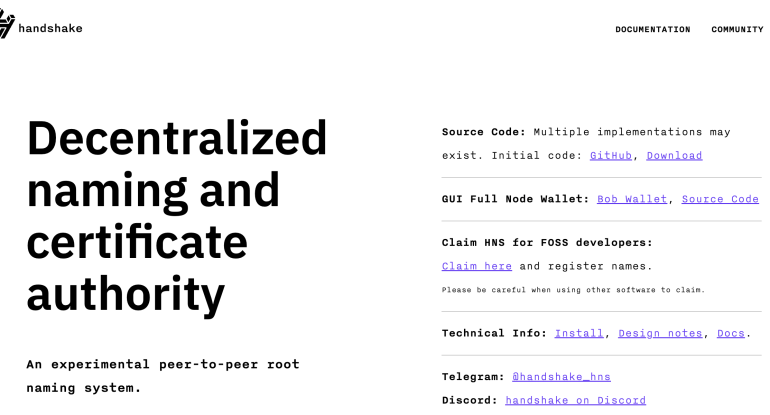Handshake (HNS) – An experimental peer-to-peer root naming system

What Is Handshake (HNS)?
Handshake is a decentralized, permissionless naming protocol where every peer is validating and in charge of managing the root DNS naming zone with the goal of creating an alternative to existing Certificate Authorities and naming systems. Names on the internet (top level domains, social networking handles, etc.) ultimately rely upon centralized actors with full control over a system which are relied upon to be honest, as they are vulnerable to hacking, censorship, and corruption. Handshake aims to experiment with new ways the internet can be more secure, resilient, and socially useful with a peer-to-peer system validated by the network’s participants.
What does Handshake do?
Handshake is an experiment on collaborating to create a decentralized network which results in a global allocation of names. Think of the handles or usernames you use on services such as social networks, and domain names identifying the URI for websites. Nearly all of these services were provided by trusted third parties which prevent the web from truly being decentralized. Handshake provides a means, including key management and server/service authentication, for decentralized web services to experiment. The Internet currently relies upon a single trust root DNS zone and an amalgamation of private companies providing trusted Certificate Authorities to secure the internet, Handshake is an experiment and exploration in alternatives. By providing a way to do decentralized lookup of name records, one can produce hashes and keys to identify resources over decentralized networks without a trusted Certificate Authority corporation.
Who Are the Founders of Handshake?
Joseph Poon and Andrew Lee are the primary co-founders of Handshake. Andrew Lee, a former Merrill Lynch employee, co-founded Purse, a major Bitcoin marketplace, in 2014. Poon, with experience at a Big Four accounting firm, played a significant role in the crypto space, contributing to projects like the Lightning Network and Plasma. Boyma Fahnbulleh and Christopher Jeffrey are also co-founders of Handshake.
What Makes Handshake Unique?
Handshake distinguishes itself by not attempting to fully decentralize the existing DNS infrastructure. Instead, its focus lies in decentralizing the root zone and top-level domains. The Handshake naming protocol differs from predecessors as it lacks namespacing or subdomains at the consensus layer. The objective is not to replace the entire DNS but to replace the root zone file and root servers.
A key aspect of Handshake is reducing dependence on the Internet Corporation for Assigned Names and Numbers (ICANN) by utilizing a decentralized application based on Proof-of-Work principles to enhance internet security.
How Many Handshake Coins Are There in Circulation?
The total supply of Handshake coins is capped at 2.04 billion, with approximately 627 million coins currently in circulation.
https://bitforum.net – Crypto forum discussions about all aspects of cryptocurrency bitforum socialfi #InnovationSocialNetwork
Discussion topic: https://bitforum.net/t/handshake-hns-an-experimental-peer-to-peer-root-naming-system/450










